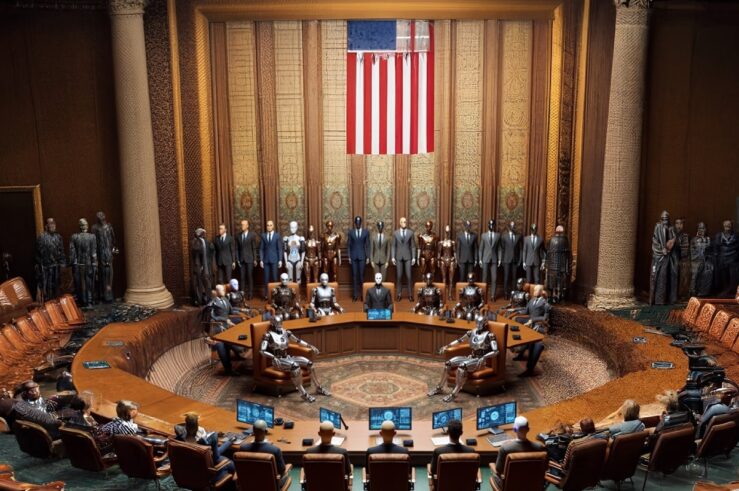Two partners form a business in 1995 for providing dial up internet service to rural Wisconsin. Their relationship deteriorates and in 1999 one (Bushard) withdraws, writing a letter expressly dissolving the partnership. (The letter presciently noted that “this is an optimal time for selling the business at maximum value.” Indeed, a firm had expressed a willingness to pay $3.5 million for it.) The other partner (Reisman) continued to operate the business for 11 years, taking a total of $700,000 in salary for his efforts. In 2006 Bushard learned Reisman was taking a salary and filed a complaint for an accounting.
The Wisconsin Supreme Court, in Bushard v. Reisman, held that Reisman was entitled to no salary for all those years, despite the fact that he worked hard and did an excellent job maintaining the business while Bushard did almost nothing. This being Wisconsin there was, of course, a strong dissent.
As the court explained, going to the Source (link added, footnote omitted):
An influential treatise explains that “[u]nless the partners agree otherwise, UPA § 18(f) [which has been codified in Wisconsin as Wis. Stat. § 178.15(6) ] permits compensation of partners for post-dissolution winding-up services, when dissolution is caused by death, but not in other cases.” Alan R. Bromberg & Larry E. Ribstein, Bromberg and Ribstein on Partnership § 7.08(d) (emphasis added.)
One is tempted to say, following Mr. Bumble, that if the law says that, “the law is an ass – an idiot.” Why shouldn’t a winding up partner get compensation? And why distinguish winding up after partner death from winding up after partner withdrawal?
My treatise goes on to explain the distinction (footnotes omitted):
[O]n inter vivos winding up there is no reason to assume a change in the partners’ expectations concerning participation in the business and compensation, but on death of a partner the allocation of work shifts to the surviving partners to the exclusion of the deceased partner’s estate * * * which changes the partners’ expectations concerning work and compensation.
Surely, you would add, a partner who completely absents himself from the business comparable to one who is dead. In fact, RUPA §401(h) changed the rule to provide for compensation in both situations.
Whatever the law says, you might insist, the court should have some power, as the plaintiff argued, to give equitable relief in such an egregious case. But the court here returns to the Source:
“the partnership statute is, to a large extent, a standard form agreement that can be varied by the parties. Because the standard form often produces unwanted results, partners are well advised to give careful advance consideration to dissolution and its consequencesand to draft explicit agreements.” Bromberg & Ribstein, supra, § 7.01(c).
The court adds (footnotes omitted):
If the provisions of the UPA are unsatisfactory, partners can and should protect their interests by agreeing to different terms. In the absence of an agreement modifying the provisions of the UPA, a court should decline from fashioning an after-the-fact remedy in pursuit of an equitable result when that remedy contravenes the public policy choices established by the legislature.
There was another issue concerning whether the partnership continued or dissolved following dissolution (which determines, among other things, whether to value the partnership as of 1999 or a later date). The court held that the trial court could appropriately enter summary judgment based on the leaving partner’s lack of consent to continue the firm.
One wonders how this could be anything other than a continuation in which plaintiff acquiesced when it went on for more than a decade. In fact, the court failed to consider an easier way to resolve the question: the partnership must dissolve when there’s only one “partner” left.
So is the law an ass when it leads to the result of one partner running the business without objection by his absent co-partner for many years and then being denied any compensation for doing so? When it allows a business to “wind up” for 11 years?
Well, consider that you gotta have clear rules. This is what statutes provide, at least in this case. If the parties don’t like the rules they can draft an agreement. If they don’t know the rules they get what they deserve.
Still not satisfied? I’m not either. But the problem isn’t with the partnership law discussed above. Where the law is really an ass is leaving the parties to a small business in a situation where they have to either know the intricacies of the law, driven by non-intuitive policy considerations, or hire an expensive lawyer who may deal with such transactions only rarely and may or may not understand what’s going on or what to do.
There is another way. The parties could have access to inexpensive software that asks the parties a series of questions and then cranks out an agreement based on the law and the parties’ answers. The parties might then show the agreement to a human lawyer to get a second opinion. They would end up with a reasonably clear document that comports with current law that they could consult when events like partner withdrawal happen.
The problem, of course, is that this seemingly sensible approach is illegal. The software would be engaged in the unauthorized practice of law. A lawyer could choose use such software to advise the client, but then the lawyer would have to forego the bigger fee he can get from customized advice. The client can’t decide for herself whether to use lawyer, software or both.
Here’s where the law is really an ass. The result is to frustrate and impede small businesspeople, part of the backbone of our commercial economy. These stories will multiply as people venture to try to rebuild our broken corporate economy by starting small sole proprietorships and partnerships.
Fixing these rules is something we can do to grow the economy without spending trillions of tax dollars. Surely at some point the logic of this approach will become self-evident.




